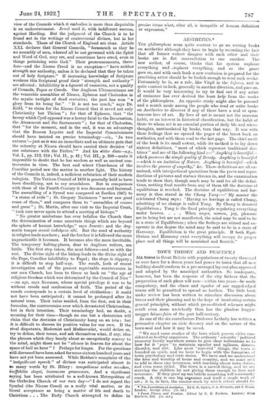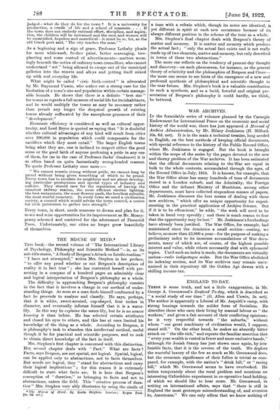TOWN THEORY AND PRACTICE.t Arm towns in Great Britain with
populations of twenty thousand or over have for a dozen years had power to insist that all new building should conform to a pre-arranged lay-out plan approved and adopted by the municipal authorities. So inadequate, however, has been the response of the city fathers that the preparation of such plans will now—within two years—be made compulsory, and the chaos and squalor of our ragged-edged towns will be permitted to spread no further. The little book under review has been written to stimulate discussion about towns and their planning and in the hope of inculcating certain general principles, without which premeditated schemes might result even more wretchedly than has the planless hugger- mugger laissez-faire of the past half-century.
As one of the six contributors Professor Lethaby has written a persuasive chapter on civic decency and on the nature of the town-soul and how it may be saved.
" We need some studies of the laws which govern cities con- sidered as healthy organisms. The ordinary ' scientific ' political economy hardly anywhere seems to give clear indications as to how far it pays ' to maintain squalor and ugliness, disease.. disorder, and dirt Like most material ' things, the town is founded on spirit, and we have to begin with the formatien of town psychology and civic desire. We have and we understand the love and worship of home and country, and we must seek to add to these city reverence, with teaching about town duties, and even some ritual. The town is a sacred thing, and we are starving the children by not giving them enough to love and reverence. If they grow up too brittle something will necessarily crack. A city is one big organiarn and itself a single work of art it is, in fact, the master-work by which others should bo • The Founantionof Aesthetics. By C. X. Ogden, J. A. Richards, and 5. Wood. London: George Allen. [7s. 6d.1 t TWA Theory and Pradiee. Edited by C. 33. Pardon. London : Bend Brothers, Ltd. [5s. net.' judged—what do they do for the town ? It is a university for production, a cradle of life and a school of manners. . . . If the town does not embody rational effort, discipline, and aspira- tion, the children will be untrained and the men and women will be unsatisfied, hopeless and anarchical—it must be so, for, as the old Greek poet said, ' The city teaches the man.' " As a beginning and a sign of grace, Professor Lethaby pleads for more whitewash, fresher paint, better scavenging, tree- planting and some control of advertisements—matters seem- ingly beneath the notice of ordinary town councillors, who cannot
understand " art " being allowed to escape out of the municipal galleries into the streets and alleys and getting itself mixed up with real everyday life.
What might be called " civic birth-control " is advocated by Mr. Raymond Unwin, who makes out a strong case for the limitation of a town's size and population within certain manage- able bounds. He shows that there is a definite " best size " for towns as regards a full measure of social life for its inhabitants, and he would multiply the towns as may be necessary rather than permit any longer the dropsical growth of existing towns already suffocated by the amorphous grossness of their " development."
Economic efficiency is considered as well as cultural oppor- tunity, and Lord Bryce is quoted as saying that " It is doubtful whether cultural advantages of any kind will result from cities over 100,000 in population which could compensate for the sacrifices which they must entail." The larger English towns being what they are, one is inclined to suspect either the good sense or the good faith of anyone professing a pride in any one of them, for (as in the case of Professor Jacks' Smokeover) it is
so often based on quite fantastically wrong-headed reasons. To quote Professor Lethaby once more :-
" We cannot remain strong without pride, we cannot long be proud without being given something of which to be proud. Every town has to emulate its neighbour and set about develop- ing particular productions and special typos of industry and culture. They should race for the reputation of having the smartest railway station, the most efficient electric lighting, the best restaurants, the most flowery park, the loveliest suburbs, the most restful cemetery. In every town we need a civilisation society, a council which would advise the town council, a centre for civic patriotism to gather into strength."
Every town, in short, needs someone to dream and plan for it, to see and seize opportunities for its improvement as Mr. Money- penny schemed and contrived for the adornment of Tamarisk Town. Unfortunately, our cities no longer grow beautifully of themselves.



































 Previous page
Previous page